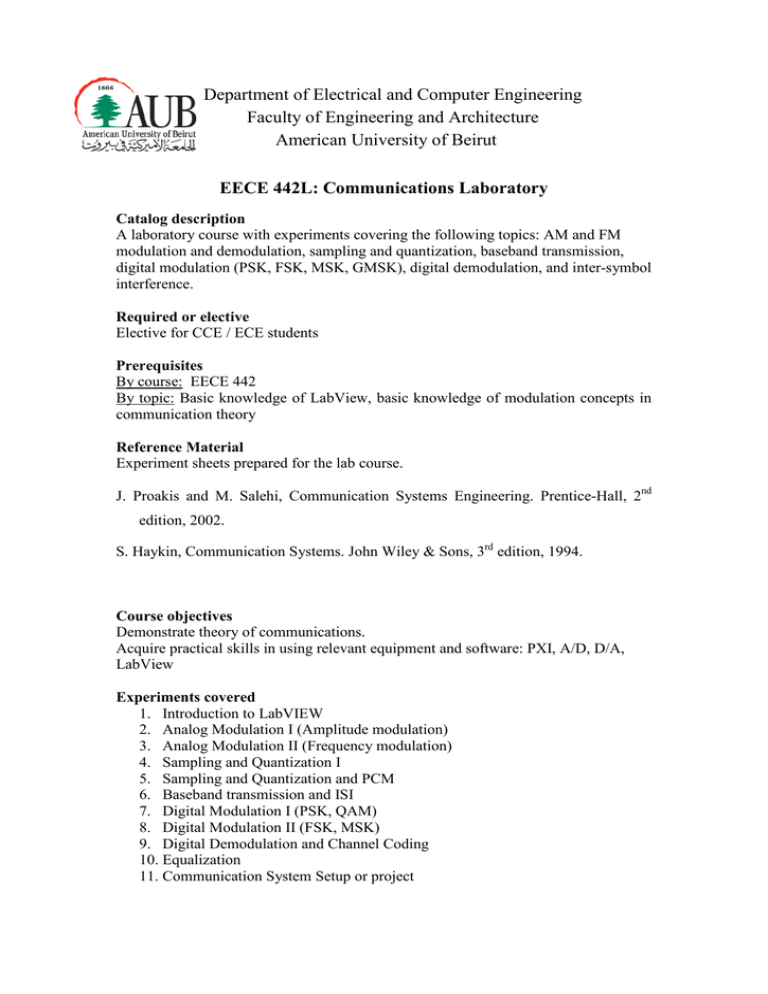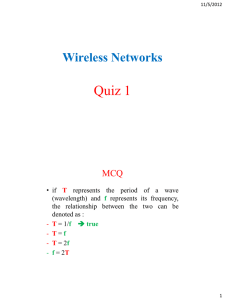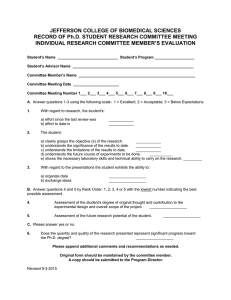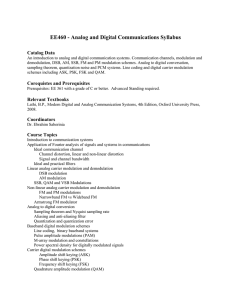442L - American University of Beirut
advertisement

Department of Electrical and Computer Engineering Faculty of Engineering and Architecture American University of Beirut EECE 442L: Communications Laboratory Catalog description A laboratory course with experiments covering the following topics: AM and FM modulation and demodulation, sampling and quantization, baseband transmission, digital modulation (PSK, FSK, MSK, GMSK), digital demodulation, and inter-symbol interference. Required or elective Elective for CCE / ECE students Prerequisites By course: EECE 442 By topic: Basic knowledge of LabView, basic knowledge of modulation concepts in communication theory Reference Material Experiment sheets prepared for the lab course. J. Proakis and M. Salehi, Communication Systems Engineering. Prentice-Hall, 2nd edition, 2002. S. Haykin, Communication Systems. John Wiley & Sons, 3rd edition, 1994. Course objectives Demonstrate theory of communications. Acquire practical skills in using relevant equipment and software: PXI, A/D, D/A, LabView Experiments covered 1. Introduction to LabVIEW 2. Analog Modulation I (Amplitude modulation) 3. Analog Modulation II (Frequency modulation) 4. Sampling and Quantization I 5. Sampling and Quantization and PCM 6. Baseband transmission and ISI 7. Digital Modulation I (PSK, QAM) 8. Digital Modulation II (FSK, MSK) 9. Digital Demodulation and Channel Coding 10. Equalization 11. Communication System Setup or project Course Outcomes Has acquired significant skills in the use of LabView Understands How Analog Modulation And Demodulation Can Be configured in a LabView simulation Understands how basic parameters effect AM modulation and demodulation Understands how basic parameters effect FM modulation and demodulation Understands how sampling and quantization can be configured in a LabView simulation Can determine the SNR related to quantization noise Understands how basic parameters effect the implementation of BPSK and M-PSK Understands how basic parameters effect the implementation of M-QAM Understands how basic parameters effect the implementation of FSK in particular with regard to bandwidth Understands how basic parameters effect the implementation of MSK and GMSK in particular with regard to bandwidth Understands the basic principles of channel coding knows the principle of determining BER for FSK and QAM Understands how intersymbol interference can arise and can be dealt with using pulse shaping and equalization Laboratory schedule 11 165-minute laboratory sessions and two tests per semester, including small project Resources of the course Reference books, online references, and Moodle. Evaluation methods Preparation Exercises and Lab reports Surprise tests Test 1 Test 2 completed 10% 40% 50% Professional component Engineering topics: 100% General education: 0% Mathematics and basic sciences: 0% Person(s) who prepared this description and date of preparation Ernst Huijer, April 2012 Date of last revision February 2013


